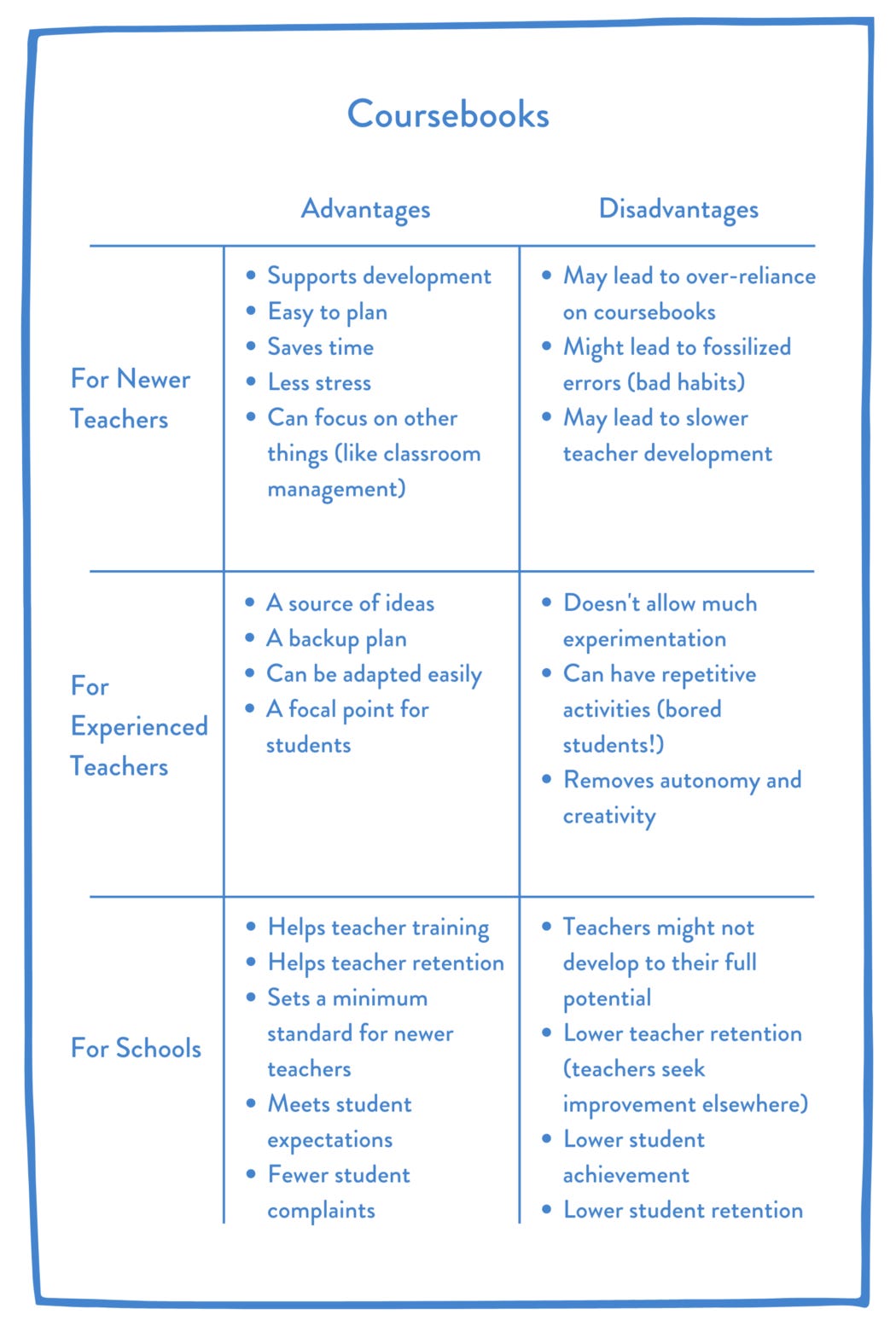Is Your Coursebook Killing Your Teacher Development?
What is your coursebook doing to your teaching?
Coursebooks are powerful — they affect lesson quality, academic achievement, teacher development and retention.
Love or hate them, they’re a fact of life for almost every teacher.
How they affect your teacher development depends on their quality, how you use them, and how your school requires you to use them. Do you want to develop and become the best teacher you can be?
Then let’s look at coursebooks' advantages and disadvantages for teachers, schools and students.
Advantages for new teachers
New teachers usually love coursebooks. I did!
When I started teaching, it was reassuring to have a structure to follow (‘two pages of the coursebook for each lesson and one for homework’).
You know what to plan and when with coursebooks, and they make planning faster. They save time, remove stress and allow time to focus on other areas.
They can also be developmental — a good coursebook has a theory of teaching embedded in its structure, which can be a good model for newer teachers to follow.
So why don’t we want to use coursebooks all the time?
Disadvantages for new teachers
Unfortunately, coursebooks aren’t perfect.
Even assuming that the coursebook you’re using is good, there are disadvantages.
First, newer teachers may rely too heavily on the coursebook and its materials and use it as the start and end of their teaching repertoire.
Second, you won’t develop your teaching skills as fast. If a class doesn’t go well, it’s easy to blame the coursebook (“Oh, the materials/activities were at the wrong level and didn’t engage the learners”).
Planning your activities and creating your materials forces you to learn to pitch them at the right level. It also helps you to understand what is engaging and effective for a group of students.
Finally, you could turn into a mindless drone, delivering the coursebook’s content without adding value. Or, as author Ian McGrath says;
“The teacher’s role is trivialized and marginalized to that of a mere technician.”
Advantages for experienced teachers
Although a lot of experienced teachers turn their nose up at their coursebook, it can still provide value:
It can be a source of ideas and inspiration.
It can be your backup plan if planning time is short.
It’s an excellent focal point for students to consolidate their learning.
Disadvantages for experienced teachers
Teachers who are required to use the coursebook exclusively get bored. There’s no autonomy, no creativity required, and again, the words of author Ian McGrath;
“It’s been argued that if teaching decisions are largely based on the textbook and the teacher’s book, this has the effect of deskilling the teacher. If the person doing the teaching cedes to the textbook rights and responsibility for planning, he or she gradually loses the capacity to exercise the planning functions.”
Advantages for schools
Coursebooks are easy.
They’re an easy concept to sell to parents.
It’s easy to help new teachers meet a minimum standard faster.
It’s easy to meet student expectations (fewer student complaints).
It’s easy to there shouldn’t be too much variability between teachers and classes.
In the short term, using coursebooks seems like a great idea—so great that the school requires the exclusive use of coursebooks with no teacher input. That’s when the disadvantages start.
Disadvantages for schools
If a school does require the use of a coursebook to the extent that no teacher-created materials are allowed, then the following are likely to happen:
Lower teacher retention — many teachers who aren’t encouraged to develop become bored and leave, which costs the school time and money.
Lower academic quality — teachers won’t develop as fast and will be bored.
Lower student retention — as the result of the above two issues.
Summary (and podcast!)
Coursebooks are a great tool if used correctly. They can form the core of a curriculum. They can be beneficial for all teachers, students and the school.
However, over-use of coursebooks can slow teacher development and cause teachers to leave. Students won’t learn as fast, and schools won’t get the long-term desired results.
If you’d like to hear me discuss these issues more, I was invited to the TEFL Training Institute’s podcast to discuss coursebooks. Click here to listen.
What do you think? How does your school use their coursebooks?
If you liked this article, you’ll love my books:
📝 Lesson Planning for Language Teachers - Plan better, faster, and stress-free (4.5⭐, 175 ratings).
👩🎓 Essential Classroom Management - Develop calm students and a classroom full of learning (4.5⭐, 33 ratings).
🏰 Storytelling for Language Teachers - Use the power of storytelling to transform your lessons (4.5⭐, 11 ratings).
🤖 ChatGPT for Language Teachers - AI prompts and techniques for language teachers (4.5⭐, 10 ratings).
💭 Reflective Teaching Practice Journal - Improve your teaching in five minutes daily (4.5⭐, 16 ratings).




